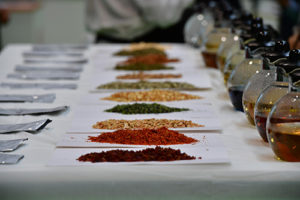Tea stays the most popular cup within the United Kingdom – no less than that was once obtrusive at this 12 months’s Tea & Coffee World Cup, which was once held in Birmingham, from September 3 to five – however the pastime in and expansion of area of expertise espresso is powerful.
According to the 2018 Tetley Tea Report, one in 5 customers are ingesting extra tea than they did a 12 months in the past. Furthermore, 34% of tea drinkers are keen to pay additional for top rate manufacturers. Tthe record additionally discovered that 29% drink extra loose-leaf tea out of house than this time closing 12 months.
Pursuant to the serious pastime in area of expertise tea and natural/fruit teas, Tea & Coffee World Cup introduced a big selection tea shows and workshops headed through Jane Pettigrew of the United Kingdom Tea Academy. The UK Tea Academy’s categories incorporated: The Basics of Brewing & Comparative Tasting, Cupping & How to Taste Tea, Tea & Cheese Pairing and Tea & Chocolate Pairing. Other tea periods incorporated Flavour, Fruit & Herbal Creations introduced through sinas GmbH & Co KG, Introduction to Japanese Tea introduced through Wollenhaupt GmbH and Matcha, From Traditional to Modern introduced through J-Port Green Tea.
Jane stated: “The term tea is used universally to mean pretty much anything that is dunked in hot – or cold water – and drunk as a beverage…since researchers and pollsters tend to include herbals and fruit infusions in their figures, but what we at UK Tea Academy are interested in is TEA – made from the tea plant – camellia sinensis.”
She famous that whilst some would possibly assume an ‘umbrella’ time period is okay, there’s a distinction between tea, herbals and culmination and “it does matter as the ingredients of tea leaves are different and the health benefits of tea are different from all other infusions.”
Nigel Melican, the president of the brand new European Tea Society, defined the will for a brand new tea affiliation taken with “creating and inspiring excellence in the specialty tea community through innovation, research, education and communication.”
Attendees thinking about area of expertise espresso had myriad shows and categories from which to select. Emma Haines of the London School of Coffee (and a Specialty Coffee Association instructor) introduced a number of categories together with: Introduction to Cupping, Brewing Part I and Brewing Part II. Sean Elder of James Aimer Ltd and an SCA instructor, held 3 categories all through TCWC: Advanced Cupping, Sensory and Cupping for Defects and To Blend or Not to Blend. Edward Anderson Brown, of Ally Coffee, who positioned 3rd on the 2018 UK Roasting Championships, taught The Effects of Roasting Degree, which tested how other roasting approaches impact the overall cup of the espresso.
In a unique consultation, the Alliance for Coffee Excellence cupped the highest 10 Cup of Excellence winners from the new Burundi pageant.
In his presentation, A Farm to Cup Story, Howard Barwick, European industry building supervisor at Olam Specialty Coffee identified that area of expertise espresso is “more than one single definition, action or circumstance,” noting that “location has influence,” prior to detailing 15 segments that convey espresso from “the farm to the cup.”
Paul Stack, president of the SCA and operations director at Marco Beverage Systems, spoke concerning the alternatives for espresso and tea firms to innovate – and the wish to achieve this on this age of generation and connectivity, and the place millennials dominate. For espresso and tea firms to search out good fortune and even stay related in lately’s local weather, Stack stated, “It’s about sustainability, provenance, quality, production, service and atmosphere.”
Other featured shows have been from firms akin to INTL FCStone, Euromonitor International, Probat-Werke, the Alliance for Coffee Excellence, Union Papertech Ltd, in addition to David Veal, the previous emblem ambassador of the SCA, whose presentation, The UK Market: A Journey Through Time, chronicled espresso’s historical past in the United Kingdom, and previous SCA president, Mick Wheeler, who spoke about Papua New Guinea’s new espresso grading requirements.


